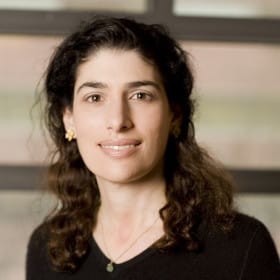Noncanonical Autophagy Inhibition as a New Approach to Melanoma Therapy
Hilary Coller, PhD
| Award Type | Established Investigator Award |
|---|---|
| Institution | University of California, Los Angeles |

Cancer treatment was revolutionized when scientists discovered how to activate a patients’ own immune system to fight tumors. Unfortunately, some patients have tumors that are seemingly invisible to the immune system.
We have been investigating the autophagy pathway, a process in which material within or outside the cell is engulfed and degraded. We found that inactivating the autophagy pathway in the cells that surround a melanoma results in a more active anti-tumor immune response and reduced melanoma growth. Inactivating autophagy in tumor-supporting cells combines with immune checkpoint inhibitors to further reduce melanoma growth.
Autophagy that eliminates cytoplasmic material is important for the viability of immune cells. We hypothesize that previous studies investigating the efficacy of autophagy inhibition for cancer treatment revealed limited effects in part because inhibiting autophagy in the patient reduced the viability of the immune cells that kill tumors.
In contrast, autophagy that degrades phagocytosed material is not required for the health of the immune cells. But autophagy that eliminates phagocyted material does suppresses the inflammatory response.
We propose to test whether eliminating only autophagy-mediated phagocytosis in immune cells, while retaining cytoplasmic autophagy in the immune cells, will result in cytokine secretion and a robust and enduring anti-tumor immune response. We will test whether this heightened immune response occurs even in tumors that would otherwise be missed by the immune system. We will further test whether eliminating autophagy-mediated phagocytosis in immune cells can cooperate with established immune checkpoint inhibition to dramatically reduce melanoma progression and metastasis.
With the goal of translating our findings to benefit cancer patients, we will test whether autophagy inhibitors have potential as cancer therapy using melanoma organoids developed from primary human melanomas. We will also test whether immune cells that lack autophagy-mediated phagocytosis can be co-introduced with melanoma cells to induce an antitumor response that impedes melanoma growth and metastasis.
Our goal is to develop new strategies to treat melanoma patients. In addition to small molecule inhibitors, we anticipate isolating stem cells from a melanoma patient’s blood, engineering the cells to eliminate autophagy-mediated phagocytosis, induce the stem cells to become macrophages, and then re-introducing the engineered cells into patients. We will also pursue a strategy of introducing a macrophage-targeted CRISPR complex that specifically engineers a patient’s macrophages to lose the ability to use autophagy for phagocytosed material. These strategies have the potential to shift tumors from “cold” to “hot,” thereby making them more responsive to immune checkpoint inhibition.

